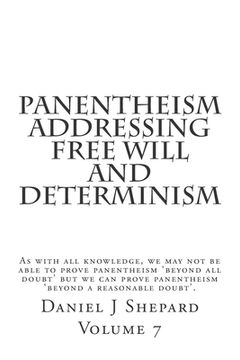Synopsis "Panentheism Addressing Free Will and Determinism (in English)"
Panentheism is a model of reality capable of resolving the conflicting concepts of free will and divine foreknowledge. Free will confined within the boundaries of determinism is simply an illusion of free will. 'There can be little question that Boethius, more than any other philosophical author, helped the great Schoolmen to retain a general comprehensive view of the world as a whole, in spite of the distractions of their minute inquiries. ' Boethius presented humanity with a model of a metaphysical system, which led to an understanding regarding how it is men retain free will within the parameters of an all-knowing entity. Boethius' metaphysical system describes an omniscient God and It's interrelationship to free will. Examination of Boethius' metaphysical system becomes the point of the first part of this tractate. The second part of this tractate is an examination of a means by which we can embrace such a system while freeing ourselves of the contradiction divine foreknowledge, determinism, pre-destination, or predestination impose upon the very concept of 'free' will. Paradoxically, the process of freeing ourselves of the confines of determinism is accomplished through a process of removing free will from the realm of determinism and then reinserting free will back into determinism through a process of 'separation through inclusion' versus 'separation through exclusion'. The exploration of 'separation through inclusion' versus 'separation through exclusion' is itself fully explored in Tractate 8: Russell. Although the in depth understanding regarding the concept of 'separation through inclusion' must wait for the Russell Tractate, we will initiate the understanding regarding such a concept within this tractate. Boethius argued we must accept free will as being recessive, submissive to divine foreknowledge, determinism, pre-destination, and predestination. Now if submissive independence is not an error, what is? Is Boethius to blame for our having been unable to resolve the paradox regarding free will and divine foreknowledge? The answer is no. We are now the ones responsible for not resolving the issue regarding the paradox of the simultaneous independent existence of free will and determinism. Philosophers have expanded our understanding of abstraction and scientists have expanded our understanding of the physical. Now it is up to us to merge the two sets of knowledge. We have the knowledge. Therefore, it is up to present day metaphysicians to assemble these pieces of the puzzle and create a new metaphysical model. An alternative metaphysical perception, metaphysical model, to Boethius' metaphysical perception exists and is presented within this tractate. The problem is to gain the attention of religion, philosophy, and science, all of whom have rejected the very validity of metaphysics itself. With this in mind, let's examine what it was Boethius laid out for us as a metaphysical perception. Let us then proceed to examine why this metaphysical system was accepted as a logical argument. We will then examine why such a metaphysical model advanced intact through history followed by an examination as to why it is we have not yet discarded this metaphysical system. Finally, let us examine why it is we can now file Boethius' system away as an interesting perception found within the annals of philosophical history as opposed to its status of being an unresolved perplexing paradox of philosophical perception.

